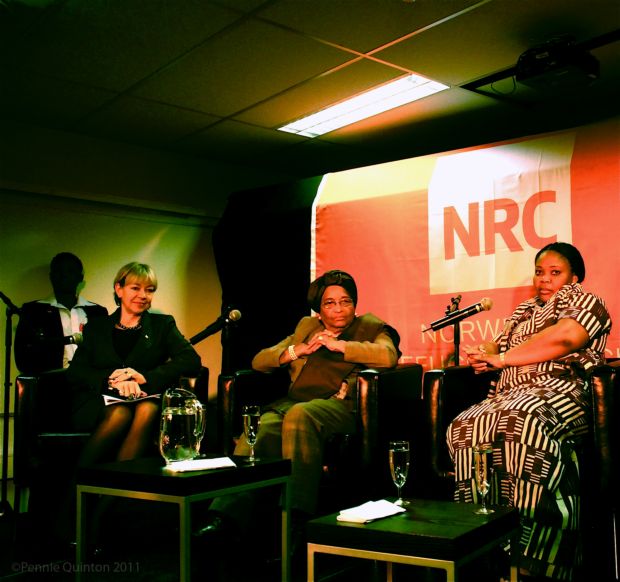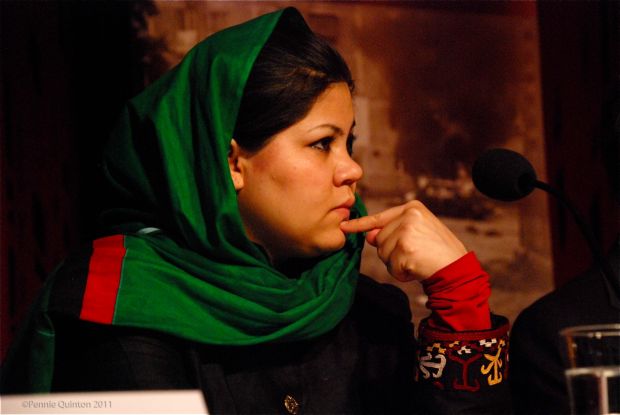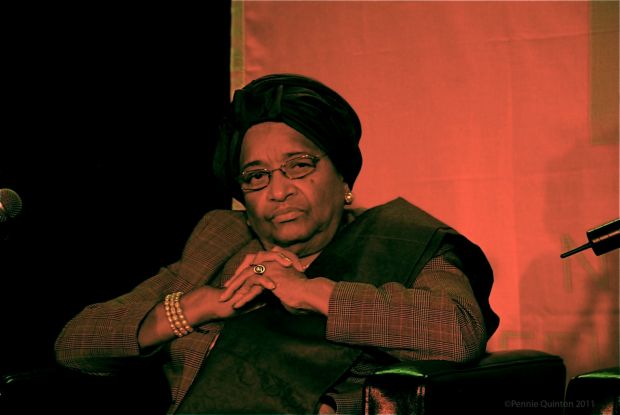Why world peace needs women Special Report
New in Ceasefire, Politics - Posted on Tuesday, January 3, 2012 8:30 - 1 Comment
Liberian President Ellen Johnson Sirleaf, & Leymah Gbowee with NRC General secretary Elisabeth Rasmusson.(©Pennie Quinton 2011)
“ If your dreams don’t scare you they are not big enough” said Liberian President Ellen Johnson Sirleaf as she opened her speech at a special event organised by the Norwegian refugee council, (NRC) on Sunday the 12th of December. The event was an the opportunity for Norwegian business elites to meet with the Liberian Nobel peace prize laureate.
From 1976 onwards women’s work for peace has been acknowledged by the Nobel peace committee a little more regularly then in past years, with eleven women recognised; but now women in developing countries coming out of conflict are calling for greater recognition of the important role of women in bringing peace and stability to their communities and countries.
President Sirleaf and Leymah Gbowee were jointly awarded the 2011 Nobel Peace Prize along with Yemeni human rights activist and journalist Tawakel Karman, founder of Women Journalists Without Chains campaign: “For their non-violent struggle for the safety of women and for women’s rights to full participation in peace-building work.”
Recently re-elected President of Liberia, Sirleaf became Africa’s first female head of state in 2006. A Harvard-trained banker and administrator, she had held positions in Citibank, the World Bank, and the United Nations.
Leymah Gbowee organised a broad women’s peace movement that made a significant contribution to bringing an end to the country’s 14-year civil war in 2003. She trained as a trauma counsellor, and is now executive director of the Women in Peace and Security Network, a pan-African organisation working to promote women’s role in peace building and conflict prevention.
In Oslo this December at a number of supporting events surrounding the Nobel peace prize, prominent women leaders and activists from: Afghanistan, Somalia, Liberia and Kenya were invited to speak on the necessity of recognition and international support for the role of women’s leadership in peace negotiations, promoting reconciliation between tribal leaders and war lords in ethnic conflict.
So just how much has women’s role in peace making been recognised by the Nobel Committee? Of the 101 individuals awarded the Peace Prize since 1901, just 15 awards went to women while just eight women were awarded the prize individually, compared to 41 men individually recognized.
Pacifist author Bertha von Suttner was the first female Laureate in 1905. Her long correspondence with Alfred Nobel is thought to have been a major influence on his decision to include in the Nobel prizes an award for peace.
It would be sixteen years before another woman, American suffragist Jane Addams, won in 1931. Another fifteen years later, in 1946, a prize was awarded to Emily Greene Balch, American academic, writer, and pacifist, for her work with the Women’s International League for Peace and Freedom; she shared it with Young Men’s Christian Association founder John Mott.
A further 46 years passed before two grass roots community activists in Northern Ireland, Betty Williams and Mairead Corrigan (née Maguire) were recognised in 1976 for their work in the Northern Ireland peace movement.
In 2006 Williams and Corrigan founded the Nobel Women’s Initiative along with sister Laureates Shirin Ebadi, Wangari Maathai, Jody Williams and Rigoberta Menchu Tum. The six women decided to bring together their experiences in a united effort to help strengthen work being done in support of women’s rights around the world.
That call was expressed at an accompanying event to the Nobel Ceremony, entitled “Women’s political leadership in peace and conflict” organised by Care Norway and the Norwegian Refugee Council on Thursday December 9 three major female political figures to spoke on this issue.
Martha Karua: former minister of Justice for Kenya who led peace negotiations through post- electoral violence.
Politician and member of the transitional Federal government of Somalia’s legislative branch Asha Ahmad Abdalla is critical of her own governments’ lack of democracy and openness. “ Somalia is the most neglected humanitarian crisis in the world, a community of mother’s grieving over their children”
Wazhma Frogh, an activist in the Afghan women’s network who joined the panel the discussion direct from the Bonn peace conference on Afghanistan and told of the problems she had faced as a woman taking part in the Afghanistan peace process.
“At the Grand Assembly or the Peace Jurga,” she reported, there were 2300 people from the whole country – but only 300 women. I was assigned to committee 13 – and I was the only woman among tribal leaders and MPs. They said: ‘we want to give her a good lesson now!’ Not only was I the only woman, but also I was a young woman. Now being a woman is a problem but being a young woman is even more of a problem.”
“On the first day I walked into the room,” Frogh recalled, “and no one said ‘hi’ to me. So for the first day I listened. On the second day I said ‘hi’ and again no one responded. As the day progressed it seemed that the process was stuck on negotiating a treaty.”
Then Frogh realized that: “the tribal leaders did not understand the difference between a treaty and an agreement. So I said: ‘can I help you?’ I stood up and explained the difference between a treaty and an agreement. On the third day they selected me as head of the programme.”
The tribal leaders saw only that they needed to be stronger, to have more guns, more soldiers and more equipment. Frogh asked them: “What do you want at the end of 2014? Two thousand men able to shoot, or efficient protection where goods and people are able to move around safely?” Committee 13 then said, “We shall lobby for you to become our representative at the Security Council.”
Wazhma Frogh says that peace in Afghanistan is only possible through campaigning at the grassroots: “people have to own it.” But NATO’s policy is not to interfere in matters considered “cultural”. Its failure to acknowledge the rights of women is detrimental to building a stable society in Afghanistan. She said to NATO representatives: “Let’s do it right – you don’t want another 9/11 and we don’t want you to come back. We have to take reconciliation back to people’s homes.”
Wazima Frogh at Care NO conference on women’s leadership in Peace negotiations. (©Pennie Quinton 2011)
NATO arms local militias, and then NATO sees a reduction in suicide attacks as a success indicator: “they don’t count how many women are able to travel safely to school or work,” Frogh says: “The biggest instruction NATO soldiers get is – don’t speak to Afghan women, because the Afghan men will kill you. If they see a woman getting killed or attacked by Afghan men they don’t get involved because that violence is ‘local, cultural’.”
“This is wrong,” Frogh concludes: “we need to lobby for the empowerment of women in the peace process. It should be women that lead the peace process. NATO Security Council really has to reform itself into a people’s organisation necessary for peace.”
Martha Karua told the conference how she had been through activism into government – and back. “The Nobel Peace Prize is,” she said, “an encouragement to women to achieve for the common good of all”.
Karua spoke of the ‘inter-connectedness’ that exists in the world: “we are working to achieve peace. We must stand out and talk about peace. There are millions in poverty and most conflicts are about a scramble for resources. There can’t be peace without women – we are giving true meaning to democracy by focusing on peace.”
The Nobel Peace Prize is, Karua said, relevant because it “encourages many people, known and unknown, to bring peace and equality to the world. Our former Kenyan prize-winner, Wangari Muta Maathai, had no recognition at home, even after receiving this prize. She finally received recognition after her death, in part due to this prize – it draws attention.” She continued: “Affirmative action for women is a favour to society, as in conflict women suffer disproportionately; women suffer more violence to their bodily integrity and to their person.”
Martha Karua said she got her place at the negotiating table in Kenya simply because she was Minister of Justice. “But I was one woman, so the other side brought in one woman, and we were able to mediate…”
“The role of women is a perspective that needs to be on the decision-making table,” Karua insists: “The struggle of claiming our space as equal women is on going, but there is an attitude of scepticism towards women: you have to prove yourself over and over. We need a lot of encouragement towards women’s empowerment, being seen as a rebel, as a non-conformist mitigates against women so you may suffer ostracisation for going against the grain. I was marginalised, but I am lucky because I chair a political party. I personally believe in the art of the possible, if you work hard enough you’ll draw positive energy towards what you are trying to achieve.”
Asha Ahmad Abdalla says, “We need to rebuild from the ground up re-uniting the people.”
She explained how women are so important in conserving the generations. “So many Somali women overseas in the Diasporas are sending money home, saving their families who are on the brink.” Empowerment of women is, she says, at the core of human rights issues: “women must be in leadership roles especially in peace negotiations.”
She went on to describe how in Djibouti women reformed the Transitional Federal Government: “100 women came up with a formula for women to be separate from the clans by negotiating between the warlords and the clans.”
Liberian President Ellen Johnson Sirleaf at Event with Norwegian business leaders. (©Pennie Quinton 2011)
Women make up the majority of Somalia’s population at 65%: “All the men died in the war. Women have been going to school and are working in education and the NGOs.” Though the constitution guarantees women 12 per cent of the places in parliament, “the warlords did not allow all 12% to participate in parliament, we only had 43 from 500, that’s around 8 per cent. Now,” Asha Abdualla said to applause, “we are looking for a female president.”
Running for president had been “the most difficult time of my life.” It’s OK in Somalia, she said, “to be in parliament, but to be a leader and a woman… I could find nothing in our religion to say women could not be leaders. I encourage our women to read religion.”
Martha Kurua noted that “even in Africa, where there is a strong tradition of women’s involvement in the community, women’s leadership is the exception, not the norm. We still need to bring a critical mass of women to the negotiating table.”
After the conference session Wahzma Frogh told me: “Women’s movements opens the way for the inclusion of other men as well. It’s not a competition, and it is not a battle. We are fighting against exclusion and discrimination. Our communities fear women but we are fighting to get our share.”
Frogh has “seen our culture changing – but culture is being used to keep women in the back seat. In conflict the law is defined by the rule of the gun and has to do with perceptions that war is necessary to get power, to be able to rule, it is a battle for power.
Men do not want to share power or privilege, they see power as being rightfully theirs but we want our share.”
In Afghanistan at the provincial council level it was all men but, Frogh reports, “25 women have taken their places – and women bring a difference, so get the support of their communities. Their decisions at village level are beneficial for the community for improved life so women do bring an active contribution.”
NATO never recognised, Frogh says, “how women are struggling in homes and villages – and are not automatically supportive of women. NATO should be supportive of women but are in fact the biggest supporters of violence on women. They do not see how women can get peace processes going NATO must change the way it looks at peace.”
At the press conference following the closed business event President Sirleaf was asked what impact the Nobel peace prize will have for women in Liberia. She described how the prize will enable the creation of a broad platform for the women’s agenda in Liberia to stop rape and help reform, transforming the prize into something that contributes to girls futures carrying along a whole generation of young people.
Leymah Gbowee recalled how she came to realise that the Liberian child soldiers were also victims of conflict: “They were recruited at 8, 9 or 10 years old, given drugs and guns. A lot of them were arrested at their place of recruitment; working with them I could see they were victims like myself. The perpetrators are the ones who give the guns and I realised then that even if it was going to kill me, I would say something; I would say something to Charles Taylor” – the civil war leader. “I would say something to Charles Taylor about the horrible future he has created for Liberia”
Leymah Gbowee gave an ironic smile as she concluded: “sometimes you get more than your wish.”






International Healing Foundation, a respected Trust based in New Delhi has awarded the 2010 PEACE INTERNATIONAL AWARD for World Peace and Human Resource Development to Vianna Stibal, Founder ThetaHealing. Grounded in humanity, IHF’s goals including spreading peace, positive health, harmony and joyous living.
The intention behind this award is to give recognition to those who have achieved greatness using high energy means, have achieved greatness doing good things for their communities, in their respective fields, and are worthy of being emulated by others.